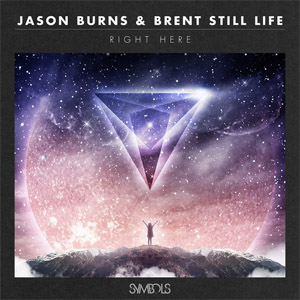Jason Burns & Brent Still Life Right Here EP
Listening to the Right Here EP, it seems safe to say that Jason Burns and […]

Listening to the Right Here EP, it seems safe to say that Jason Burns and Brent Still Life were not willing to venture into any sort of risky sonic territory—or even step just slightly outside of accepted bass-music formulas—on their first collaborative EP. Across its five tracks, the record hits the listener over the head with the commonplace features of space-age bass music, doing little to differentiate itself from the overflow of current productions which come wrapped in glowing chords, skittering drums, and R&B touches.
In its defense, there is nothing outright offensive about Right Here, but that may be part of the problem; the EP comes off as completely by the numbers and as a result, rather lifeless. The sleek, vocal-driven garage of “Lightning” (a solo production by Burns which features vocalist Reva DeVito) comes off like a second-hand Disclosure track, and the following “I Could Blame You” (a solo production by Still Life) is the kind of slow-motion post-dubstep tune we’ve heard over and over again, complete with the familiar infusion of moodiness and led by—you guessed it—a procession of chopped and tuned vocal samples. Perhaps the most glaring effort though is “Ain’t Nobody Do It,” the second of the two offerings Burns and Still Life work on together, as it attempts to fuse neon-glowing trap and commercial rap into a relevant hybrid, but with a cringe-worthy amount of chorused “Hey!”s and a drastically over-the-top sampled vocal hook that makes it hard to get through the whole song.
Fortunately, the record’s title track and its remix, courtesy of Athens-based artist We Sink, provide Right Here with a few redeemable moments. The original again indulges in the more familiar end of the bass-music spectrum, but displays the EP’s most tasteful use of vocal chops and is built around an enticing halftime rhythm that is hard to deny, while the remix flips the tune into a skipping slice of soulful, synth-led house.
In the end, Burns and Still Life are more victims of circumstance than a lacking of talent—as the bank of bedroom bass-music producers continues to explode, it is almost impossible to make an impact by simply coloring inside the lines.

